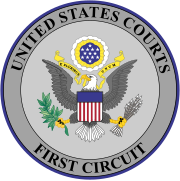| Commonwealth of Massachusetts v. United States Department of Health and Human Services | |
|---|---|
 | |
| Court | United States Court of Appeals for the First Circuit |
| Full case name | Commonwealth of Massachusetts v.United States Department of Health and Human Services, et al. |
| Argued | April 4 2012 |
| Decided | May 31 2012 |
| Citation | 682 F.3d 1 |
| Case history | |
| Prior history | 698 F.Supp.2d 234 (D.Mass. 2010) |
| Subsequent history | Petitions for certiorari filed with the U.S. Supreme Court (No. 12-15 and 12-97) denied. |
| Related cases |
|
| Holding | |
| Section 3 of DOMA fails a less-deferential rational basis review on Equal Protection Clause claims; the Spending Clause and Tenth Amendment do not proscribe DOMA, but they do influence the analysis of DOMA's justifications under equal protection review. | |
| Court membership | |
| Judges sitting | Sandra Lynch, Chief Judge, Juan R. Torruella and Michael Boudin, Circuit Judges |
| Case opinions | |
| Majority | Boudin, joined by Torruella and Lynch |
| Laws applied | |
| U.S. Const. amend. V, XIV Defense of Marriage Act | |
Commonwealth of Massachusetts v. United States Department of Health and Human Services 682 F.3d 1 is a United States Court of Appeals for the First Circuit decision that affirmed the judgment of the District Court for the District of Massachusetts in a lawsuit challenging the constitutionality of section 3 of the Defense of Marriage Act (DOMA), the section that defines the terms "marriage" as "a legal union between one man and one woman as husband and wife" and "spouse" as "a person of the opposite sex who is a husband or a wife."[1] Both courts found DOMA to be unconstitutional, though for different reasons. The trial court held that DOMA violates the Tenth Amendment and Spending Clause. In a companion case, Gill v. Office of Personnel Management, the same judge held that DOMA violates the Equal Protection Clause. On May 31, 2012, the First Circuit held the act violates the Equal Protection Clause, while federalism concerns affect the equal protection analysis, DOMA does not violate the Spending Clause or Tenth Amendment.
The First Circuit, anticipating that the parties would seek a review of the decision, stayed its decision. Both the Department of Justice and Commonwealth of Massachusetts asked the U.S. Supreme Court to review the decision by filing petitions for a writ of certiorari. The Supreme Court decided a similar case, United States v. Windsor, on June 26, 2013, and dismissed the petitions the following day.
Cite error: There are <ref group=n> tags on this page, but the references will not show without a {{reflist|group=n}} template (see the help page).
- ^ "Defense of Marriage Act". United States Government Printing Office. September 21, 1996. Retrieved July 25, 2010.
© MMXXIII Rich X Search. We shall prevail. All rights reserved. Rich X Search
